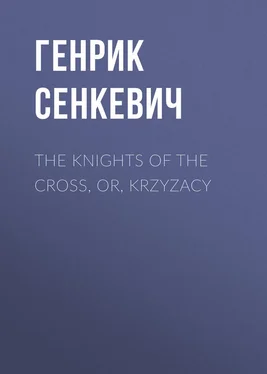Генрик Сенкевич - The Knights of the Cross, or, Krzyzacy
Здесь есть возможность читать онлайн «Генрик Сенкевич - The Knights of the Cross, or, Krzyzacy» — ознакомительный отрывок электронной книги совершенно бесплатно, а после прочтения отрывка купить полную версию. В некоторых случаях можно слушать аудио, скачать через торрент в формате fb2 и присутствует краткое содержание. Жанр: foreign_antique, foreign_prose, на английском языке. Описание произведения, (предисловие) а так же отзывы посетителей доступны на портале библиотеки ЛибКат.
- Название:The Knights of the Cross, or, Krzyzacy
- Автор:
- Жанр:
- Год:неизвестен
- ISBN:нет данных
- Рейтинг книги:4 / 5. Голосов: 1
-
Избранное:Добавить в избранное
- Отзывы:
-
Ваша оценка:
- 80
- 1
- 2
- 3
- 4
- 5
The Knights of the Cross, or, Krzyzacy: краткое содержание, описание и аннотация
Предлагаем к чтению аннотацию, описание, краткое содержание или предисловие (зависит от того, что написал сам автор книги «The Knights of the Cross, or, Krzyzacy»). Если вы не нашли необходимую информацию о книге — напишите в комментариях, мы постараемся отыскать её.
The Knights of the Cross, or, Krzyzacy — читать онлайн ознакомительный отрывок
Ниже представлен текст книги, разбитый по страницам. Система сохранения места последней прочитанной страницы, позволяет с удобством читать онлайн бесплатно книгу «The Knights of the Cross, or, Krzyzacy», без необходимости каждый раз заново искать на чём Вы остановились. Поставьте закладку, и сможете в любой момент перейти на страницу, на которой закончили чтение.
Интервал:
Закладка:
His confidence increased, however, when after mass and a long rest, he heard the conversation between the abbot and Anna Danuta.
The wives of the reigning kings and princes, both on account of devotion as well as on account of the magnificent presents, sent them by the Master of the Order, were very kindly disposed toward the Knights of the Cross. Even the pious Jadwiga, as long as she lived, restrained her husband's anger against them. Anna Danuta alone, having experienced dreadful wrongs from the knights hated them with her whole soul. Therefore when the abbot asked her about Mazowsze and its affairs, she began to complain bitterly against the Order:
"Our affairs are in a bad condition and it cannot be otherwise with such neighbors! Apparently it is the time of peace; they exchange ambassadors and letters, but notwithstanding all that nobody can be sure of anything. The one who lives on the borders of the kingdom, never knows when he goes to bed in the evening, whether he will awaken in fetters, or with the blade of a sword in his throat, or with a burning ceiling over his head. Neither oaths, nor seals, nor parchment will protect from treachery. Thus it happened at Zlotorja where during the time of peace, they seized the prince and imprisoned him. The Knights of the Cross said that our castle was a menace to them; but the castles are repaired for defence not for an onset; and what prince has not the right to build and repair in his own land? Neither the weak nor the powerful can agree with the Order, because the knights despise the weak and try to ruin the mighty. Good deeds they repay with evil ones. Is there anywhere in the world another order which has received as many benefits from other kingdoms as the knights have received from Polish princes? And how have they repaid? With threats, with devastation of our lands, with war and with treachery. And it is useless to complain, even to our apostolic capital, because they do not listen to the Roman pope himself. Apparently they have sent an embassy now for the queen's confinement and the expected christening, but only because they wish to appease the anger of this mighty king for the evil deeds they performed in Litwa. But in their hearts they are always plotting means to annihilate this kingdom and the whole Polish nation."
The abbot listened attentively with approval and then said:
"I know that Comthur Lichtenstein came to Krakow at the head of the embassy; he is very much respected in the Order for his bravery and intelligence. Perhaps you will see him here soon, gracious lady, because he sent me a message yesterday, saying that as he wished to pray to our holy relics, he would pay a visit to Tyniec."
Having heard this, the princess began to complain again:
"The people say – and I am sure rightly – that there will soon be a great war, in which on one side will be the kingdom of Poland and all the nations speaking a language similar to the Polish tongue, and on the other side will be all the Germans and the Order. There is a prophecy about this war by some saint."
"Bridget," interrupted the scholarly abbot; "eight years ago she was canonized. The pious Peter from Alvastra and Matthew from Linköping have written her revelations, in which a great war has been predicted."
Zbyszko shuddered at these words, and not being able to restrain himself, asked:
"How soon will it be?"
But the abbot being occupied with the princess, did not hear, or probably did not wish to hear, the question.
The princess spoke further:
"Our young knights are glad that this war is coming, but the older and prudent ones speak thus: 'We are not afraid of the Germans, although their pride and power are great, but we are afraid of their relics, because against those all human might is powerless.'"
Here Anna Danuta looked at the abbot with fear and added in a softer voice:
"They say they have a true piece of the holy cross; how then can one fight against them?"
"The French king sent it to them," answered the abbot.
There was a moment of silence, then Mikolaj of Dlugolas, called Obuch, a man of great experience, said:
"I was in captivity among the Knights of the Cross; I saw a procession in which they carried this great relic. But beside this, there are many other relics in the monastery in Oliva without which the order would not have acquired such power."
The Benedictines stretched their necks toward the speaker, and began to ask with great curiosity:
"Tell us, what are they?"
"There is a piece of the dress of the Most Holy Virgin," answered the wlodyka of Dlugolas; "there is a molar tooth of Marya from Magdala and branches from the bush in which God the Father revealed himself to Moses; there is a hand of Saint Liberjus, and as for the bones of other saints, I cannot count them on the fingers of both hands and the toes of both feet."
"How can one fight them?" repeated the princess, sighing.
The abbot frowned, and having thought for awhile, said:
"It is difficult to fight them, for this reason; they are monks and they wear the cross on their mantles; but if they have exceeded the measure of their sins, then even those relics will refuse to remain with them; in that case they will not strengthen the knights, but will take their strength away, so that the relics can pass into more pious hands. May God spare Christian blood; but, if a great war should come, there are some relics in our kingdom also which will succor us."
"May God help us!" exclaimed Zbyszko.
The abbot turned toward the princess and said:
"Therefore have confidence in God, gracious lady, because their days are numbered rather than yours. In the meanwhile, accept with grateful heart this box, in which there is a finger of Saint Ptolomeus, one of our patrons."
The princess extended her hand and kneeling, accepted the box, which she immediately pressed to her lips. The courtiers shared the joy of the lady. Zbyszko was happy because it seemed to him that war would come immediately after the Krakowian festivals.
CHAPTER IV
It was in the afternoon that the princess left hospitable Tyniec and went toward Krakow. Often the knights of those times, coming into larger cities or castles to visit some eminent person, used to put on their entire battle armor. It is true it was customary to take it off immediately after they arrived at the gates; in fact it was the custom for the host himself to invite them to remove it in these words: "Take off your armor, noble lord; you have come to friends!" This entrance was considered to be more dignified and to increase the importance of the knight. To conform with this ostentatious custom Macko and Zbyszko took with them those excellent suits of armor and shoulder-bands – won from the conquered Fryzjan knights, – bright, shining and ornamented on the edges with a gold band. Mikolaj of Dlugolas, who had seen the world and many knights, and was very expert in judging war things, immediately recognized that the suits of armor had been made by a most famous armorer of Milan; armor which only the richest knights could afford; each of them being worth quite a fortune. He concluded that those Fryzes were mighty lords among their own people, and he looked with more respect on Macko and Zbyszko. Their helmets, although not common ones, were not so rich; but their gigantic stallions, beautifully caparisoned, excited envy and admiration among the courtiers. Macko and Zbyszko, sitting on very high saddles, could look down proudly at the whole court. Each held in his hand a long spear; each had a sword at at his side and an axe at the saddlebow. For the sake of comfort they had left their shields in the wagons, but even without them, both men looked as though they were going to battle and not to the city.
Both were riding near the carriage, in which was seated the princess, accompanied by Danusia, and in front of them a dignified court lady, Ofka, the widow of Krystyn of Jarzombkow and the old Mikolaj of Dlugolas. Danusia looked with great interest at the two iron knights, and the princess, pulling from time to time the box with the relics of Saint Ptolomeus from her bosom, raised it to her lips.
Читать дальшеИнтервал:
Закладка:
Похожие книги на «The Knights of the Cross, or, Krzyzacy»
Представляем Вашему вниманию похожие книги на «The Knights of the Cross, or, Krzyzacy» списком для выбора. Мы отобрали схожую по названию и смыслу литературу в надежде предоставить читателям больше вариантов отыскать новые, интересные, ещё непрочитанные произведения.
Обсуждение, отзывы о книге «The Knights of the Cross, or, Krzyzacy» и просто собственные мнения читателей. Оставьте ваши комментарии, напишите, что Вы думаете о произведении, его смысле или главных героях. Укажите что конкретно понравилось, а что нет, и почему Вы так считаете.












